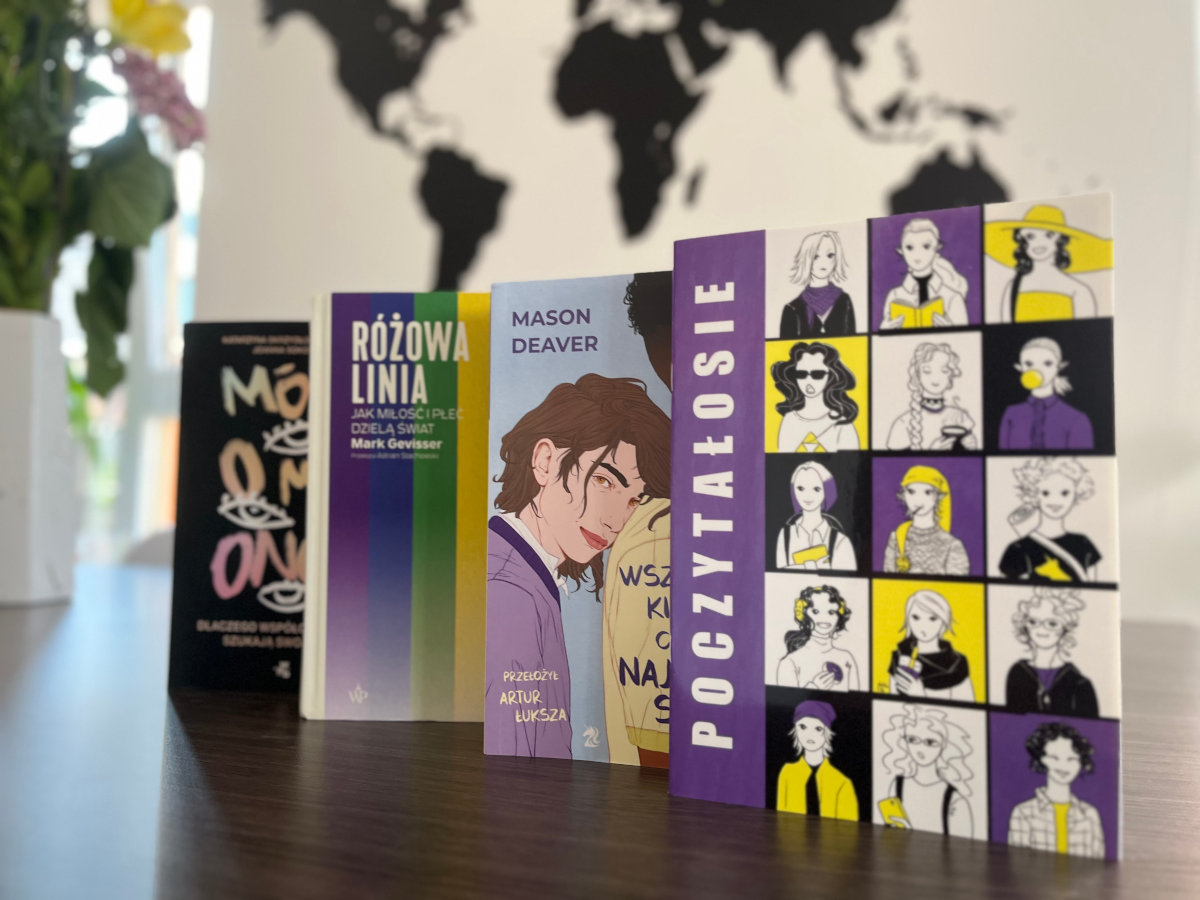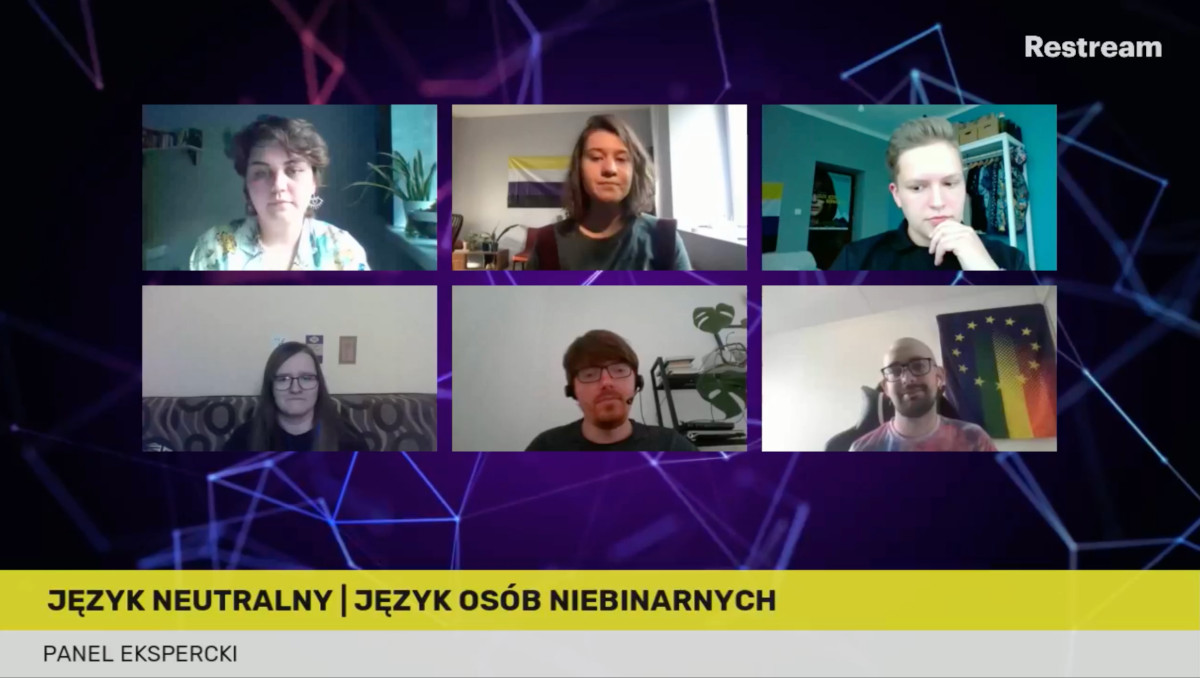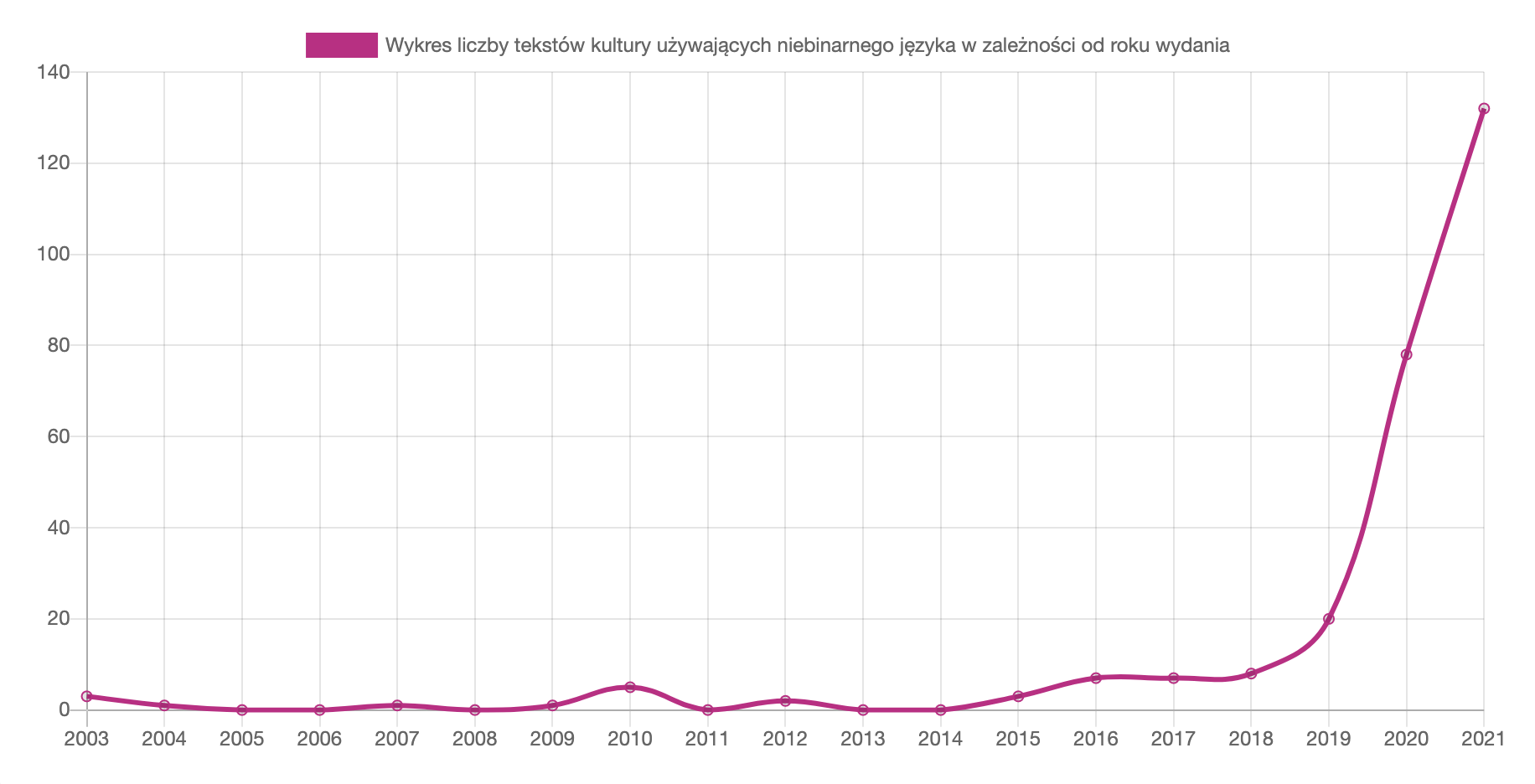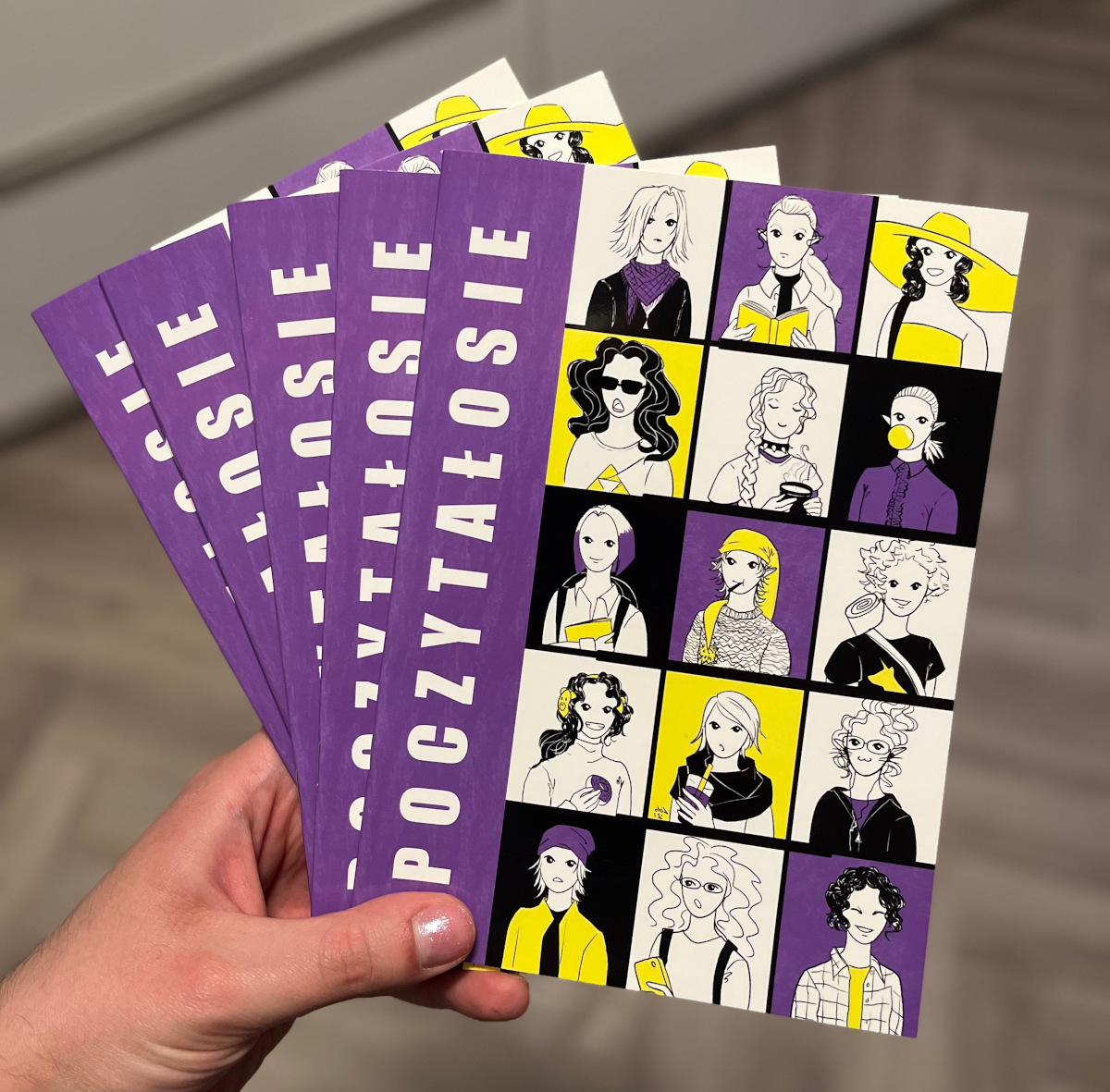The amazing revolution of niebinarszczyzna
2023-06-07 | @andrea

Every once in a while I get reminded of just how much of what we do is pretty much invisible for most visitors of Pronouns.page, simply because a big chunk of our work is focused on a language that they don't speak 😅
As you might know, this project started out as “zaimki.pl”, a website that collects, promotes and educates about different ways to avoid gendering oneself and others in a highly gendered language – Polish.
But the story doesn't end there. Over the last few years we're seeing big changes in how nonbinary Polish – or niebinarna polszczyna, or niebinarszczyzna – evolves, gains social acceptance, legitimacy, and popularity among the nonbinary folks themselves.
So I wrote down a summary of what we've been up to on the Polish side of Pronouns.page. Admittedly, a little bit as a boast – but most importantly I'm hoping to inspire current and future activists in other places by showing what kind of initiatives are possible. Enjoy reading!
Table of contents
- Why is it so hard for nonbinary people to express themselves in Polish?
- Polish Nonbinary Census
- Manifesto
- Neutratywy, osobatywy
- Media appearances and mentions, workshops and lectures
- Explosion in the number of texts using nonbinary language
- Books and video games – sensitivity reviews, consultations, credits, auspices
- Terminology
- Inclusive dictionary
- Zine
- Our own grammatical plural gender
- Unisex names dictionary and data analysis
- Recommendations for translators, creators of questionnaires, and medical personel
- Impact on the academia
- Spellchecker – ISJP
- Summing up…
Why is it so hard for nonbinary people to express themselves in Polish?
Before we get to the main part of the post, let me start with a TL;DR introduction to how gender works in Polish. A slightly longer one is available here, if you're interested, and if you're not interested at all, feel free to scroll down to the next section – just know that gender in Polish is massively complicated.
The thing is, unlike in English where it's (almost) all about the pronouns, in Polish there's an entire system of noun classification called grammatical gender (which is different from human gender, albeit somehow linked). Every noun has an innate gender, e.g. a table is masculine (“ten stół”), a spoon is feminine (“ta łyżka”) and a chair is neuter (“to krzesło”) – there's no real “logic” in it, it's just a grammatical class. Many other languages have a system like that (German der/die/das, French le/la, Dutch de/het, etc.), but Polish makes stuff very complicated considering how many other parts of speech must align with the noun's gender – as well as with people's personal pronouns…
In Polish you can't say something as simple as “I did” without expressing your gender. It's either “zrobiłam”, if you're using feminine forms, or “zrobiłem”, if you go with masculine ones. For “I'm hungry” – it's either “jestem głodna” or “jestem głodny”. Basically: it's not just about pronouns in a bunch of grammatical forms, but an entire system of pronouns and suffixes. And it's not just about people talking about you (3rd person) – the grammatical gender that you use influences things you say about yourself (1st) and things that people say to you (2nd). It's hard to speak normative Polish when you're nonbinary.
How come? – you might ask. – Didn't you just say that there's a third grammatical gender, neuter? Well, yes! You could say “zrobiłom” and “jestem głodne”. But here's a thing: although technically grammatically correct and not without some historical use, in practice it's not really being used for humans (rarely for children, but in 3rd person only), and referring to an adult with such forms would be considered by most to be insulting and weird. Or maybe I should say: it used to be like that? After all, us queers tend to be great at reclaiming slurs and turning the weird and insulting stuff into something that we wear with pride. In the recent years the neuter forms seem to have gained a surprising amount of support, representation and understanding – at least in the leftist circles and amongst the younger generations.
But there are other options too. One might use plural forms, as a kind of calque from the English they/them and/or extension of historical and regional pluralis majestatis – although an extra complication here is that Polish has two plurals: masculine personal (“zrobiliśmy”, “głodni”) and non-masculine (“zrobiłyśmy”, “głodne”). There's also a system that we might call neopronouns (or rather neogender), called dukaizmy, that takes advantage of the fact that the vowel “u” is not used by any other gendered forms, so we end up with “zrobiłum”, “głodnu”. In writing, people also often use graphical placeholders, eg. “zrobiłxm” and “głodnx”, or “zrobił_m” and “głodn_”.
And I haven't even started talking about the gendered nouns yet… Think of “actor – actress” or “fiancé – fiancée” – as opposed to “painer”, “politician”, “worker” etc. Except in Polish there are hardly any nouns describing a person's job or relationship that aren't gendered (and also a subject of a heated public debate even when it comes to letting women describe themselves without androcentric nouns). Such nouns don't follow any easy grammar tables, we basically had to create a whole dictionary with thousands of entries!
Believe it on not – that was the TL;DR version… Polish grammatical gender is complicated AF 😅 Making it more inclusive is no easy endeavor. So how do we go about doing that?
Polish Nonbinary Census
One of our biggest undertakings each year, as well as the biggest research endeavor of this kind in Poland, is running the Polish Nonbinary Census, a survey of the Polish nonbinary language – with 2211, 1816, and 3022 answers in the respective years. It's inspired by Cassian's Gender Census. Even if you don't understand a word of it, you might wanna open the most recent report and just scroll through the charts, tables and collapsable sections (even though I automated the generation of many parts of the report, it's still been a ton of work to put it together, so I might as well show it off 😉).
I can't express how valuable for us is the data that we collect there. Without it, we'd basically be walking in the dark, always uncertain if we even make any tangible difference, and if our recommendations, efforts and goals actually reflect the actual usage in the community…
The Census gives us useful information for recommending translators the forms they might wanna use for nonbinary characters. It helps Polish enbies chose their own pronouns. It gives us solid arguments against claims that “no one uses those forms in real life”. It's a great tool to measure how much braver the community gets each year about using unconventional language, and also to pinpoint and tackle the reasons why they don't. Many people say that through filling out the survey they found out about possibilities they weren't aware of before. People who don't know many/any other enbies IRL say that just seeing the data makes them feel valid and less lonely.
And for me personally… analysing the Census data gives me confidence that our efforts are worth it.
Manifesto
Polish-speaking enbies have many options to express themselves now, and sometimes it just seems like there are… too many. After all, it's a relatively new area of language, still in a state of a linguistic primordial soup, and it touches on many aspects of an already complicated grammar system. It's easy to get overwhelmed!
So we used the knowledge gained from the Census data, as well as historical sources and expert opinions that we'd found, we've analysed the trends we see and the linguistic and sociological context in which nonbinary Polish is used, and we formulated a Manifesto of niebinarszczyzna.
We're not being prescriptive about it, we're not claiming that we know best how language should or has to be used, but there's been a need for some kind of guidance on how to navigate the new forms – so we prepared a document in which we explain why respecting nonbinary identities and our language matters, and which forms seem to be on the best way to become a norm in the near future and to create a consistent system.
Our Manifesto makes life a bit easier for enbies looking for pronouns for themselves, or authors and translators looking for pronouns for their characters, or even just allies trying to make sense of all of it.
Neutratywy, osobatywy
As I mentioned before, Polish nouns describing people's occupations and relationships are very gendered and not regular. Think of triples like “barman – barmaid – bartender” – except the concept applies to basically all such nouns, plus the second form still keeps stirring some controversies, and also the third form… doesn't exist.
But here's a thing about language: if there's a need to describe something, language will accommodate that need. After all, helping us express ideas and communicate with each other is literally its main purpose. When humanity invented printers, lasers, computers or space rockets, we also had to invent the words to describe them. And when nonbinary identities started becoming less suppressed by the society and the need arose to better describe ourselves, it became invitable that our language would evolve to fulfil it. That evolution is happening right in front of our eyes.
Sybil came up with a system called neutratywy that combines the relevant roots with endings of nouns that might not describe people, but are grammatically neuter. For example “autor” (author, masc.) can receive the ending and declension of “morze” (sea, neuter) to produce “autorze” (author, neuter). It's a brilliant system, in which brand-new words can accurately describe someone, be easily understood by people hearing them for the first time, and, thanks to using known suffixes and following known declension patterns, feel like a natural part of the language – even though they sound very weird at first.
Neologisms are, of course, common in languages, but adding an entire, vast category of nouns to the vocabulary is quite a rarity. Our English dictionary of gender-neutral language has around a hundred entries, and mostly normative, while Polish has over five thousand neologisms! And they're not just art for art's sake – they address a real need of the community and are gaining actual use.
Aside from neutratywy, we also proposed less complex noun systems that grammatically match the neopronouns/neogender and graphical forms. But there's one more concept worth mentioning:
Osobatywy are forms that combine a gender-neutral word “osoba” (person) with a descriptor. Admittedly, they're a bit of a mouthful and might sound clunky, but they allow to describe a nonbinary person or a person of unknown/irrelevant gender without using non-normative language. Credits for coming up with this idea go to Fundacja Trans-Fuzja, (but we're also proud of helping popularise it 😉).
Media appearances and mentions, workshops and lectures

If you open zaimki.pl/media, you'll see a list of our appearances and mentions in various media outlets. Some of them are, admittedly, tiny, but the list also includes likes of Newsweek Poland, one of the biggest TV stations in the country (TVN), and even the conservative government propaganda machine (TVP). Our members have been invited to live interviews, have been giving lectures, leading workshops, entering into polemics with journalists.
What struck me most about those experiences is how much acceptance and curiosity we've been welcomed with. Of course conservatives are gonna conserve, but among more open-minded people it's always been an absolute pleasure to discuss nonbinary identities and gender-neutral language with people ready to learn.
Setting up a tiny, simple website about language, I never would've thought that just a few months later I'd be showing my face to thousands of people and educating them about a topic so niche that we, just a bunch of queers with a passion for language, basically became experts in it. Just scrolling through that list is a bit overwhelming to me.
Explosion in the number of texts using nonbinary language

We collect a corpus of sources (books, press articles, movies, series, games, songs…) that use nonbinary language. It's by no means a complete catalogue, nor are the inclusion criteria very strictly defined, but it's a very useful collection nonetheless. I was curious how did the number of such sources change over time, so I put it on a chart.
As you can see, until 2018 usages were sparse. But in 2019 an uptick starts, and in 2020 (when zaimki.pl were created) and 2021 it turns into quite a spike.
By no means am I claiming that it's us who made that happen – after all, the growing acceptance towards nonbinary people and our increased representation in media (both Polish and translations of foreign texts) must be responsible for a huge chunk of that spike. But I like to think that our efforts in popularising and normalising nonbinary language have also contributed to that trend. Maybe we inspired some Polish authors to include unapologetically nonbinary characters in their literature, and maybe we convinced some Polish translators to properly represent such characters instead of erasing their identity through language, as used to be more common.
Books and video games – sensitivity reviews, consultations, credits, auspices
If you head to zaimki.pl/linki, you'll see a couple of book covers. That's because we've been participating in the process of their creation. Our team members have been doing sensitivity reviews, advising the translators, providing suggestions. We did what little we could to promote those books, and we're proud to see our logo in the “auspices” section on their covers.
One time we responded to an email, in which a translator was asking a bunch of questions about their project (without revealing what it is). To our surprise, a few months later someone messaged us, asking if we're aware that we're mentioned in the closing credits to the game Bugsnax 🤯
And that's not even the only video game that we've been involved with. I recently did sensitivity reviews for a big game company for two upcoming titles and an internal DEI guide. Unfortunately, NDA won't let me say much more, but still… it's all so exciting!
Terminology
Although the Dictionary of Queer Terminology exists also in other language versions of Pronouns.page, there's a bit more to it than just gathering a bunch of terms with flags and definitions.
The idea behind the dictionary was to promote Polish versions of queer terms instead of simply borrowing them from English. Not that we're against loanwords – after all my own language is basically Poglish (or rather Pong-ger-dutch-lish?), so who am I to judge – but in this context popularising Polish alternatives plays its role in refuting queerphobes' claims that our identities aren't our own, that we're just blindly following a “trend from the West”.
Many of the terms are translated quite literally, but with a few we had to be a bit more creative – including for example płynnopłciowość (genderfluid), zmiennopłynność (fluidflux) or nekronim (deadname).
Inclusive dictionary
Similarly, the Dictionary of inclusive language was initially meant for the Polish website and only later extended to English. Currently it has three times as many entries as the English version!
Zine
There was a time when people questioning their gender who were asking in online spaces for materials that might help them to navigate that journey were primarily getting the following response: learn English. There was simply not enough places where you could read about other enbies' experiences in Polish.
It's been improving since, of course, but as a part of our contribution to the process we wanted to create a zine where members of our community could share their thoughts and experiences. We were open to all (printable) forms of expression, which resulted in a great variety among the entries – ultimately the zine ended up containing prose, poetry, prose poetry, opinion pieces, drawings, and even a diagram-story.

Fun fact: the layout of the zine was created by my partner – despite them not speaking Polish at all! And my husband came up with the name for it: “Poczytałosie”, which is a play on words “reading” and “moose”. Why moose? Because the 2nd person past tense verbs form of the neuter grammatical gender end with -łoś, which happens to… also be a word for “moose”.
The zine is published as a PDF at zaimki.pl/zin, but we've also assigned an ISBN to the publication and printed out a hundred physical copies that we shared with the authors, editors and members of the Collective – and the National Library too!
Our own grammatical plural gender
Yet another androcentric complication of the Polish grammatical gender system is that when talking to or about groups of people, one should pick a gender according to some pretty weird rules. Groups of women are described with the same forms (eg. “kobiety były”) as animals (“psy były”) and inanimate objects (“krzesła były”) – but a single man joining their group “upgrades” their grammatical gender to masculine personal forms (eg. “widzowie byli”).
So we've decided to come up with a brand new grammatical gender that would be totally gender-neutral and fine to use by anyone – without having to wonder what gender are members of a given group and which rules to apply. We've brainstormed a system that's inspired both by normative singular neuter forms, and by plural pronouns in other Slavic languages; and we ended up with a neat system of “ona/ich”. It's not normative, and admittedly hasn't gained much popularity (yet?), but we're very proud of it – and of course we use it when describing ourselves as a Collective.
Unisex names dictionary and data analysis
Rejestr PESEL is a government database containing information about Polish citizens and residents. Some data from the register are publicly available – including statistics about how many people bear any given name.
So I analysed this public data set to see which names are used by people with both “male” and “female” legal sex markers. Admittedly, simply because that's the case does not necessarily mean the name is commonly considered “unisex”, but it was still a fun and informative analysis. It can also be a useful guide to picking a name and an argument to be used when applying for a legal name change.
But speaking of guides to picking a new name – we also created exactly that: a dictionary of gender-neutral names. It's still not as complete as we would wish, so we haven't added it to other languages yet, but it's already a very helpful knowledge base.
Recommendations for translators, creators of questionnaires, and medical personel
We're getting asked regularly to weigh in on some dilemmas or questions that people have about the nonbinary and gender-neutral language. Some researchers were asking how to prepare the demographic questionnaire in order to be inclusive of people of all genders. So our team discussed the common pitfalls we're seeing in such forms and we've prepared a recommendation (which would actually also be useful in English, I should get around to translating it whenever I have a moment 😅). Later it was followed by a blog post regarding questions of marital status.
Translators were asking for advice regarding the choice of Polish forms that would most closely resemble the original choice of (neo)pronouns – so we prepared a guide for translators.
A friend GP is also the editor of a magazine for doctors and he asked us to prepare a guide for them; and here it is: part 1 and part 2.
Impact on the academia
We maintain a page listing academic sources and statements by scholars regarding nonbinary, inclusive and gender-neutral language. It's not massive, but the subject is already gaining some interest in the academic circles, and our project specifically is having an impact too. There are papers on the subject, studies, people mention us in their theses and quote us and our Census data as sources.
Spellchecker – ISJP
It's one thing when a computer or a smartphone adds a little red squiggle under the words that you use to describe yourself – even if you only use those forms that are considered by experts to be “grammatically correct”, albeit niche. But it gets very annoying when the spellchecker decides to just arbitrarily assign you a gender. Yet that's what happens to thousands of Polish-speaking enbies every day.
Teaching your spellchecker a new word is simple – but here it's a question of an entire category of words! The solution for that must come from the developers, not individual users… So we've started a (bilingual) petition to software companies and contributors to fix that bug.
Yes, a bug. We're not even asking for a new feature, the petition is only about the most basic case, the neuter 1st and 2nd person past tense verbs – forms that are considered by the Polish Language Council to be “correct and consistent with the language system”, forms that have been used by poets centuries ago and noted in grammar books.
Unfortunately, so far that hasn't yielded any results… But we didn't stop there. I learned the basics of the Hunspell format and wrote a script that extends an open-source spellcheck dictionary to include the missing forms. The result is ISJP (this website is bilingual too) and it consists of two dictionaries: normative and neological.
Unfortunately, the subject of spellchecker dictionaries isn't easy… I'm not experienced in writing this kind of code, testing it is a struggle, and so is even trying to use it… Every app that uses a spellchecker requires a separate and different process to install a custom dictionary – if it even allows it at all. And trying to get “the big guys” to support it out of the box is not something I have time, energy and network to do…
Still, even if its practical uses are limited, I'm very proud of this project and I'm glad that it exists, even if mostly as a statement. And, of course, it's always open for someone with more expertise to swoop in and help out 😉
Summing up…
When a queer student association from the Jagiellonian University invited us to an expert panel, I felt uneasy about being called experts at first. After all, we're just a bunch of queers running a website, right? Sure, language is our passion, some of us have formal training in this subject, and one of us is even getting a PhD – but still, there must be someone more qualified than us, right?
But here's a thing – there doesn't seem to be… Yes, there are some very respected linguists friendly to our cause, but there's also the other dimension to this area of linguistics: the experience of being a nonbinary person who actually needs this language and uses it in their everyday life. When an enby, or a translator, or an editor, or an educator, or anyone else who cares about proper representation and inclusion of nonbinary identities in their language, when they have a question about the subject, they don't ask prof. Miodek, or prof. Bańko, or the RJP – they pop us an email. It's absolutely bananas. It's a subject niche enough that we, a humble bunch of queers, rose to the ranks of experts on it; but simultaneously a subject so important and quickly growing and evolving that academia, media and the public take notice.
Running this project is not just about coding a platform for cards and adding entries to a bunch of dictionaries. Zaimki.pl let me do so many things that I never thought I'd ever be doing and enjoying. And I'll be forever grateful to the universe for the opportunity to be in the middle of this amazing linguistical nonbinary revolution ❤️